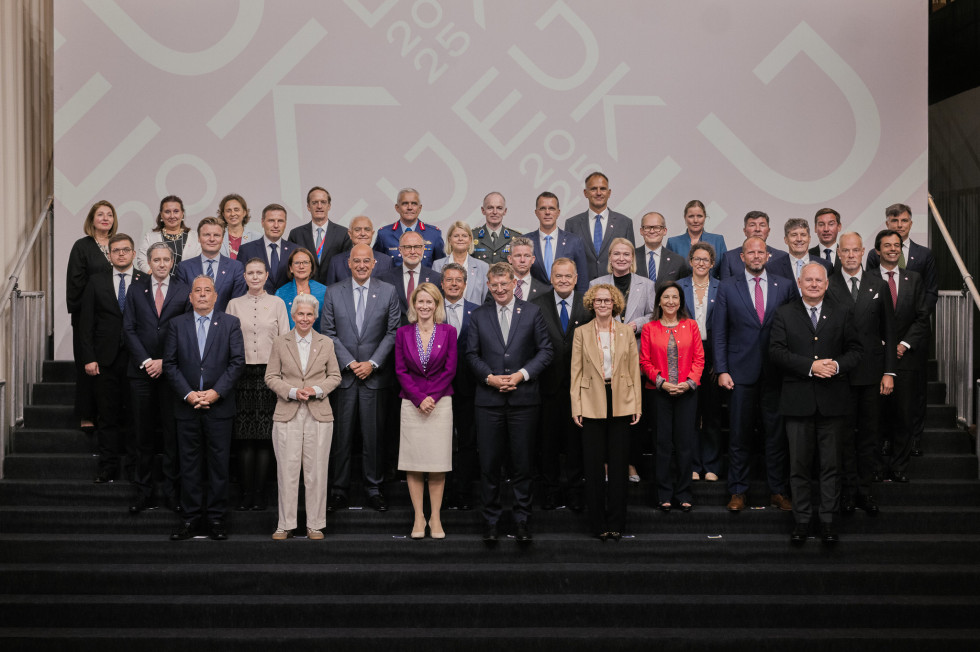Informal meeting of European Union defence ministers in Copenhagen concludes
During the first part of the meeting, the ministers discussed European Union support for Ukraine. They talked, in particular, about the possibilities and ways of increasing military support for Ukraine, including through initiatives by the High Representative for Foreign Affairs and Security Policy, Kaja Kallas, and some Member States regarding the provision of ammunition, missiles, and air defence. The meeting was also an opportunity to discuss efforts to strengthen cooperation and integration between the European Union and Ukraine in the field of the defence industry and to continue supporting the EUMAM Ukraine operation. NATO Deputy Secretary General Radmila Shekerinska also attended the discussion.
In his intervention, Minister Sajovic emphasized that Slovenia's support for Ukraine is to remain unchanged. He highlighted the unity of our efforts, which is crucial for establishing conditions for peace and security in Ukraine and for its people. It is also important to coordinate the various efforts and initiatives taking place in different formats, through the European Union, NATO, bilateral activities, and other coalitions, with the aim of achieving complementarity and maximizing impact. We are currently exploring opportunities for cooperation in the field of defence industry, rehabilitation, and humanitarian demining projects. Strengthening cooperation with Ukraine in the field of the defence industry is not only important for ensuring its long-term self-defence capabilities, but also brings significant benefits to all member states, Minister Sajovic pointed out. Ukraine's combat experience, which has taken a high toll, is very valuable and can help in the development of new defence technologies. Minister Sajovic concluded his discussion with the information that the Republic of Slovenia is considering options of cooperation with Ukraine in the field of the defence industry, where talks are already underway.
The first session was followed by a discussion on defence readiness. In light of the results of the June European Council and NATO summit, ministers discussed the implementation of the proposals in the Joint White Paper for European Defence Readiness 2030 and the proposed REARM plan to strengthen European defence, particularly with regard to progress in defining specific capability projects. In the second discussion, Minister Sajovic emphasized that our common priority was to implement the White Paper on Defense Readiness in line with our national priorities. This means, above all, filling long-standing critical gaps in the overall security of the European Union and reducing dependence on external actors. Slovenia is continuing to explore opportunities for cooperation with other Member States in line with our national priorities, the Minister added, praising the work of the European Defence Agency in helping countries to harmonize their various interests in the field of capability development and the defence industry. Given that the deadline of 2030 is relatively short, the cooperation of all Member States and institutions is crucial, and the role of the European Defence Agency is irreplaceable, particularly in ensuring transparency and conditions for joint activities of all Member States. The establishment of a Government to Government (G2G) platform by the European Defence Agency is an excellent example of ensuring such conditions, Minister Sajovic added.
At the third and final session, the ministers reviewed operations and missions under the European Union's Common Security and Defence Policy. After being briefed on current developments in this area, the ministers discussed how the European Union could continue to support and adapt the military operations of the European Union's Common Security and Defence Policy to the changing security environment. The discussion focused primarily on three broad areas: (1) the development of threats and new challenges, (2) strategic objectives and strategic impact, and (3) aligning resources with objectives. As the Minister pointed out in this part of the discussion, operations and missions should be adapted to the new geopolitical and security environment. As part of a comprehensive approach, they should be used effectively to help restore peace and stability in conflict areas and to develop the security and defence capabilities of our partners in line with the interests of the European Union. This should also be the guiding principle when formulating their mandates.
Prior to the informal meeting of defence ministers, the Danish Presidency organized a high-level conference featuring two panels presenting the experiences and good practices of the Nordic countries in defence cooperation and a discussion on European defence and industrial cooperation with Ukraine.

Family photo of participants on the second day of the informal meeting of European Union defense ministers in Copenhagen. | Author Svet EU

